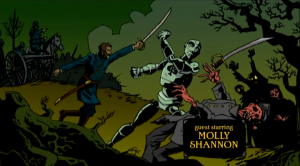Date read: 8.3.09
Read from: Personal collection
Reviewer: Emera
I picked this and #15 up at a used book sale, partly out of a fit of pique that I couldn’t find anything else to my taste – even though I didn’t know anything about the actual quality of the anthology series. Luckily, every story in this was well written and solidly above average, which is more than can be said for most of the anthologies I’ve read in my life.
To begin with the best, my absolute favorites, in no particular order:
- Kelly Link’s feverish, extremely unnerving “Stone Animals” (come on, even the title is creepy). Young couple with poor communication and two small children, including a sleepwalking daughter, moves into a new house where all is not quite well – classic set-up for horror, and Link plays it gleefully. I imagined her whooping maniacally while writing the story, truth be told.
- Lisa Tuttle’s “My Death,” the story of a recently widowed writer who travels in search of new inspiration, and becomes strangely entangled in the legacy of an early 20th-century painter and his muse. This builds slowly, but goes places that are increasingly strange and tap into very primitive, raw forces. The ending was completely unpredictable and bewildering in the best way possible. Masterfully executed, all in all.
- Michael Marshall Smith’s supremely atmospheric and ever-so-delicately frightening “This Is Now.” Describing it would ruin it, so I won’t. This gave me the most chills-down-the-spine read, yet the fear is so deliciously subtle and evanescent.
Continue reading The Mammoth Book of Best New Horror 16, ed. Stephen Jones (2005) E
